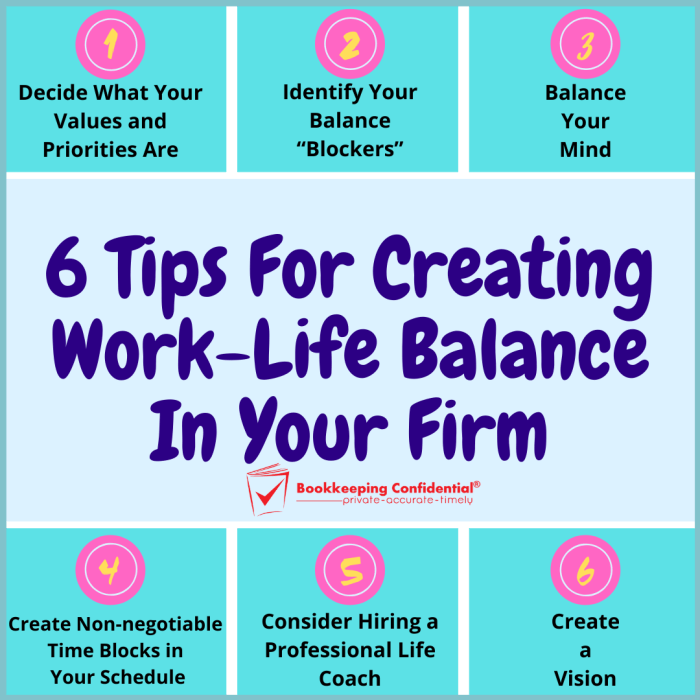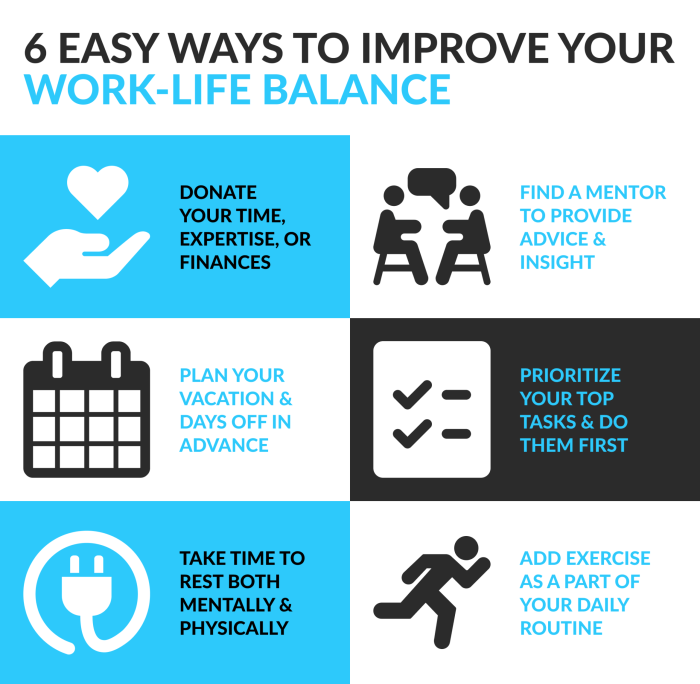Work-Life Balance Tips: In today’s fast-paced world, finding the perfect equilibrium between your career and personal life is essential for overall well-being and success. Let’s dive into some effective strategies to achieve that balance.
Importance of Work-Life Balance: Work-Life Balance Tips

Work-life balance is crucial for overall well-being as it helps individuals maintain a healthy equilibrium between their professional responsibilities and personal life. When this balance is achieved, it can lead to greater happiness, reduced stress levels, and improved relationships.
Impact of Poor Work-Life Balance
- Poor work-life balance can negatively impact mental health, leading to increased levels of anxiety, depression, and burnout.
- It can also have detrimental effects on physical health, such as higher risk of heart disease, obesity, and other chronic illnesses.
- Furthermore, poor work-life balance can strain relationships with family and friends, leading to feelings of isolation and disconnection.
Achieving Work-Life Balance for Increased Productivity and Job Satisfaction
- When individuals are able to balance their work and personal life effectively, they are more likely to feel motivated, focused, and energized in the workplace.
- Having time for leisure activities and self-care can rejuvenate the mind and body, leading to higher levels of productivity and creativity at work.
- Additionally, employees who feel a sense of balance in their lives are more likely to experience job satisfaction, leading to higher retention rates and overall organizational success.
Strategies for Achieving Work-Life Balance

Achieving work-life balance is essential for overall well-being and productivity. Here are some effective strategies to help you maintain a healthy balance between work and personal life:
Setting Boundaries
Setting clear boundaries between work and personal life is crucial. Create designated work hours and stick to them. Avoid checking work emails or taking work calls outside of these hours. Communicate your boundaries with colleagues and employers to ensure respect for your personal time.
Time Management Techniques
Effective time management is key to prioritizing tasks and maintaining work-life balance. Make a to-do list or use time-tracking tools to organize your tasks. Identify high-priority tasks and allocate specific time slots to work on them. Break down larger tasks into smaller, manageable steps to avoid feeling overwhelmed.
Importance of Self-Care
Self-care practices play a significant role in maintaining work-life balance. Make time for activities that help you relax and recharge, such as exercise, meditation, hobbies, or spending time with loved ones. Prioritize your physical and mental well-being to prevent burnout and enhance productivity in both your work and personal life.
Remote Work and Work-Life Balance
In today’s digital age, remote work has become increasingly common, blurring the lines between work and personal life. This shift has brought about new challenges and opportunities for maintaining a healthy work-life balance.
Challenges of Work-Life Balance in Remote Work
Working remotely can make it difficult to separate work time from personal time, leading to longer work hours and increased stress. The lack of physical boundaries between work and home can make it challenging to switch off and unwind at the end of the day.
Tips for Maintaining Boundaries When Working from Home
- Set specific work hours and stick to them to create a routine.
- Create a designated workspace that is separate from your living area.
- Take regular breaks and schedule time for exercise and relaxation.
- Communicate your boundaries with your colleagues and family members.
Benefits and Drawbacks of Remote Work on Work-Life Balance, Work-Life Balance Tips
Remote work offers flexibility and freedom, allowing individuals to better manage their time and reduce commuting stress. However, it can also lead to feelings of isolation, longer working hours, and difficulties in separating work from personal life.
Work-Life Balance for Entrepreneurs and Small Business Owners
Entrepreneurs and small business owners often find it challenging to juggle the demands of their work with their personal lives. Managing a business can be all-consuming, but it is crucial to find a balance to avoid burnout and maintain overall well-being.
Strategies for Balancing Work and Personal Life
- Delegate tasks: Entrepreneurs should learn to trust their team and delegate tasks effectively to free up time for personal activities.
- Set boundaries: Establishing clear boundaries between work and personal life is essential. Designate specific work hours and stick to them to ensure personal time is protected.
- Prioritize tasks: Identify the most critical tasks that need immediate attention and focus on completing them first to avoid feeling overwhelmed.
Challenges Unique to Entrepreneurs
- Uncertain work hours: Entrepreneurs often work irregular hours to keep their businesses running smoothly, making it challenging to separate work from personal life.
- High levels of responsibility: As the leaders of their businesses, entrepreneurs bear the ultimate responsibility for its success, leading to increased stress and pressure.
- Lack of resources: Small business owners may have limited resources, making it difficult to delegate tasks or take time off without impacting the business.
